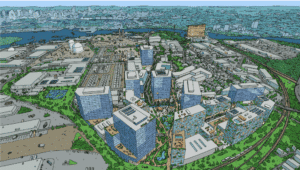The $500 million energy storage project proposed in the first phase of The Davis Cos. redevelopment of Everett’s former Exxon Mobil fuel tank farm received a key state approval.
The Davis Companies of Boston requested a fast-track approval from the Executive Office of Energy and Environmental Affairs for the Trimount Energy storage project by Jupiter Power. The battery-based energy storage site is the first phase of a 7.2 million mixed-use project, dubbed “Everett Docklands Innovation District” by its developer. The Texas energy company plans to construct a pair of open-air substations totaling 2.1 acres to gather and discharge electricity from renewable sources such as offshore wind.
Jupiter has sought to begin construction in 2026 and complete the facility in 2027. The 700-megawatt project would be located on a 20-acre site and tie into a nearby Eversource substation on Alford Street in Boston next to the former Exelon Mystic Generating Station.
The battery cells would be grouped in containers and surrounded by 2-foot-thick walls ranging from 10 to 40 feet. The project also includes small warehouse and office buildings.
The Everett Docklands project’s timing is designed to meet the state’s climate goals to reduce dependence on fossil fuels, a factor that Secretary of Energy and Environmental Affairs Rebecca Tepper cited in approving a waiver providing for an accelerated approval process.
In waiving further review of the energy project under the Massachusetts Environmental Policy Act, Tepper said the Jupiter Energy’s Trimount Energy storage facility “supports the transition to a clean energy grid such that further MEPA review would delay these public benefits.”
Friday’s decision enables the energy storage project to move forward before the larger Everett Docklands Innovation District project undergoes a draft environmental impact report.
Other elements of The Davis Companies’ Everett Docklands master plan include 3,200 housing units, 3.3 million square feet of lab and office space, 400,000 square feet of industrial and 400,000 square feet of manufacturing space, and 240,000 square feet of retail space on 86 acres. The development in those future phases would be subject to a separate state and local review.
Everett officials are reviewing a proposed new master plan zoning bylaw that would apply to the entire project. The project’s ability to attract financing also hinges upon the state Legislature’s approval of a new clean energy procurement law.








